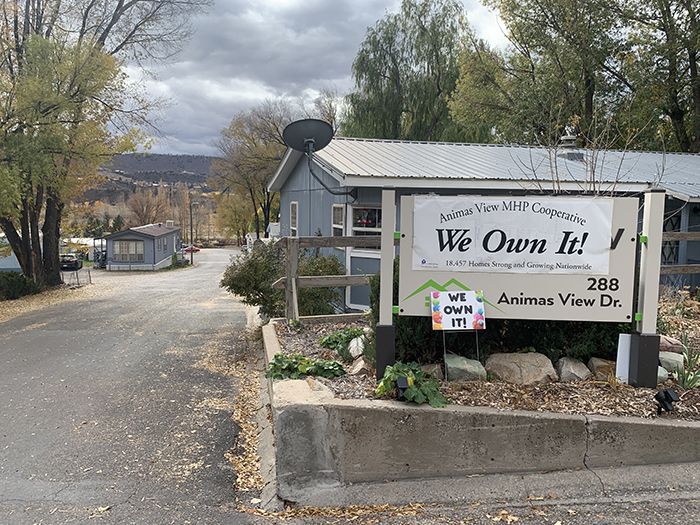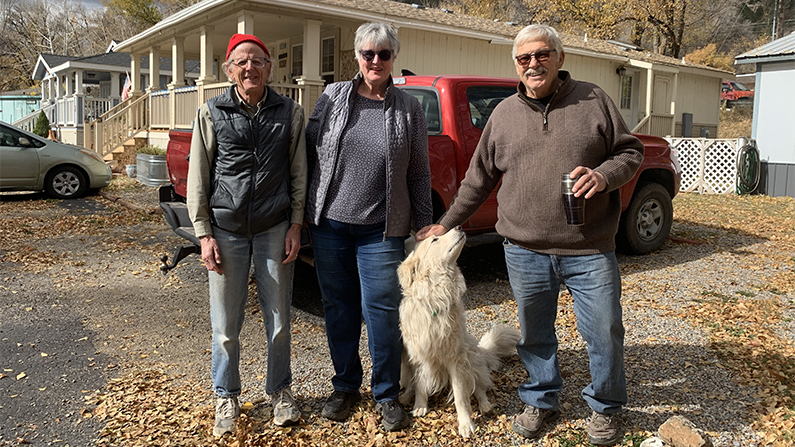Historically, mobile-home or manufactured-home communities have served as an important source of low to middle-income housing across the West. But these days, residents of these communities are often subject to rent increases and buyouts without much protection. And in some cases, that means park residents are being displaced.
Lisa Bloomquist is the executive director of Homes Fund, a nonprofit housing organization that works with some mobile home parks in Southwest Colorado.
“When rents in these communities are going up, you know, 40% a year,” said Bloomquist. “It’s just what people are having to pay, or else they’re getting foreclosed on and giving up their house entirely.”
But a number of manufactured home communities have found a way to counteract this trend–by becoming their own landlords. In Colorado, a state law that was passed back in 2019 gives residents at a park first dibs on buying their park if it goes up for sale. That’s exactly how the Animas River View Park in Durango was purchased by its residents.

Residents purchased the Animas River View mobile home park from its corporate owner earlier this year. Now, they run it as a co-op. (Lucas Brady Woods/KSJD)
The 120-unit park sits on the city’s outskirts along the winding Animas River. A sign at the entrance reads “We Own It” with an exclamation point. John Egan is the president of the park’s board and has lived in the park for about a decade. When the park was purchased by corporate owners back in 2016, rents started to increase at a rate that just wasn’t sustainable for some community members.
“There are many people who have lived here 20, 30 years who would have ultimately been driven out of the park just because of the continuing rent increases,” said Egan.
That’s one reason why he and other residents worked together to buy the park from the corporate owner earlier this year. Now, the park is a co-op. That means it’s being run by a resident-elected board. And the board has a mandate: keep prices affordable for residents and make sure the purchase of the park doesn’t result in residents having to leave.
The board is also made up of people who actually live in the park, like Egan. That creates both buy-in from the community and accountability for how the park is run.
“The community aspect of this is essential,” he said. “Our residents are really taking pride in the property. It’s getting cleaned up. People know each other now. People have a certain kind of respect for the property and are proud of it.”
But getting residents organized and finding the money to buy a manufactured home park is by no means simple. George Cheney lives about 40 miles to the west of Durango in Montezuma County. He’s looking into how the co-op model could work for manufactured home parks there. And he said there are challenges, starting with getting everyone involved in a park on the same page.
“There has to be a sustained effort on the part of a group of people that would include an owner, whether that’s an individual or a company or family, whatever,” said Cheney.
Cheney also said the resident-owned model is not without risks.
“It could be that a mobile home park that kind of transitions to a resident-owned community and goes along for a while, and they find that they can’t keep costs down as they hoped,” he said.
Costs to purchase and maintain a park are usually too high for residents to afford on their own. Animas View’s price tag, for example, was $14 million.
That’s why financial partners are a big part of the process. Lisa Bloomquist’s organization, Homes Fund, was one of a number of organizations that helped Animas View residents with funding for the initial purchase. But those loans have to be paid back somehow. And repayment costs can translate into higher rent costs in the short term.
“Financing $14 million, even with favorable terms,” said Bloomquist. “The lot rents did not go down immediately.”
In fact, when the residents formed the co-op, rents went up at first. But Bloomquist also said she’s confident they will go down over time. For Animas View board president John Egan, though, the results are worth the expenses and coordination required to make the resident-owned model work. And for other parks that are considering pursuing a similar model, Egan has a few words of advice:
“Don’t wait, don’t wait a minute,” he said. “Get organized now, make the connections you need to make, be ready to move the minute that park comes up for sale.”
He also said it’s important to remember that the work doesn’t stop at purchasing the park. Now that the residents have purchased Animas View, they have to run it, and that takes a lot of time and resources too. But despite its limitations, the model does seem to be catching on in other parts of the states. Resident-owned parks have already established themselves in communities from Colorado Springs to Leadville.
This story is part of a reporting project between the Solutions Journalism Network and Rocky Mountain Community Radio highlighting affordable housing solutions across the Mountain West.






